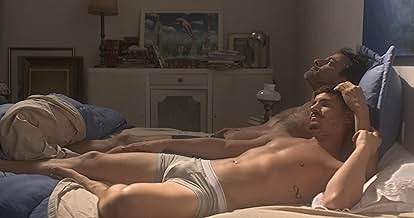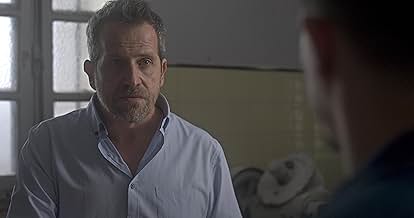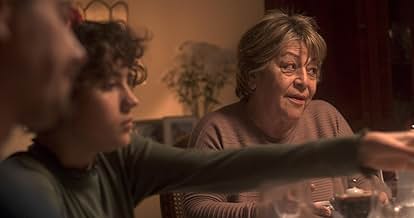Des secrets dans le placard
Titre original : Todos tenemos un muerto en el placard o un hijo en el clóset
NOTE IMDb
6,1/10
400
MA NOTE
Ajouter une intrigue dans votre langueComing out of he closet is never easy, but the gay son has already come out to his parents. They weren't happy, but they still love him. The son arrives home, only to learn that his partner ... Tout lireComing out of he closet is never easy, but the gay son has already come out to his parents. They weren't happy, but they still love him. The son arrives home, only to learn that his partner has dumped him.Coming out of he closet is never easy, but the gay son has already come out to his parents. They weren't happy, but they still love him. The son arrives home, only to learn that his partner has dumped him.
- Réalisation
- Scénario
- Casting principal
Avis à la une
This had the potential to be a good film. Sadly, the poor writing, unrealistic scenes and poor acting ruins this. Lead character was good, but it appears none of the adults have any idea what acting is (aside from reciting your lines). There was zero emotional connections to the pivotal scenes. It all seemed so forced and fake. Why include a crying scene by someone who has no idea how to show genuine emotion.
My biggest problem with this: it appears the writer gave up on this story, got tired or was under a deadline. After all the drama and trying to build something meaningful (albeit very poorly) ..suddenly, somehow, all the major problems are resolved and things neatly wrapped up in the last 2 minutes. Ridiculous!!
My biggest problem with this: it appears the writer gave up on this story, got tired or was under a deadline. After all the drama and trying to build something meaningful (albeit very poorly) ..suddenly, somehow, all the major problems are resolved and things neatly wrapped up in the last 2 minutes. Ridiculous!!
Watched this during the Tampa International Film Fest. The storyline is good, the lead actor did a great job. Moves a bit slow and clunky at first but comes together nicely. The film is really about relationships with family and their expectations. Liked the ending.
The cinematography is very static, you won't see many cuts or different camera angles, which could be an artistic choice or a budget constaint, but it's not necessatily a bad thing. Speaking of budget constaints, a lot of action is shown off-screen. For example there will be a party but you never see the non-main cast guests, it can be a bit bothersome sometimes, as the movie is not really a "shut off from the outside world" type of movie. There is also a funny sequence at the beginning, where the characters are going out for a jog, and it's obvious that every shot is recorded at the same block.
Sometimes a character will be friendly, just to turn confrontational in the next scene, without indication that the friendliness was fake. This is not necessarily the actors' fault, it's also a script problem. This is also apparent when characters will make a fuss about insignificant things, and you're supposed to take it seriously. Another sign of a posible script problem is when at the end the main character shows some traits that make him seem like an asshole, which I'm not sure if they were intentional.
So far I've been kinds negative, but even with it's faults the movie is enjoyable, you can relate with the characters and situations as they are common to many families, like going back to your hometown, talking about sex to your sibling, having a judgemental grandma, having a dissappointed parent, or having a one sided relationship. The movie does have heart in it.
Sometimes a character will be friendly, just to turn confrontational in the next scene, without indication that the friendliness was fake. This is not necessarily the actors' fault, it's also a script problem. This is also apparent when characters will make a fuss about insignificant things, and you're supposed to take it seriously. Another sign of a posible script problem is when at the end the main character shows some traits that make him seem like an asshole, which I'm not sure if they were intentional.
So far I've been kinds negative, but even with it's faults the movie is enjoyable, you can relate with the characters and situations as they are common to many families, like going back to your hometown, talking about sex to your sibling, having a judgemental grandma, having a dissappointed parent, or having a one sided relationship. The movie does have heart in it.
Summary:
This dramatic comedy effectively rounds out a story about the "return to payment" where the reconfiguration of family ties after coming out of the closet is combined with the theme of the prodigal son, professional vocation, future work, reunions and pacts and family management, forming a dynamic that does not necessarily have to do only with inbreeding village environments.
Review:
Manuel (Facundo Gambandé) is an architecture student. The film begins with him saying goodbye to his partner who is going to live in Europe. He then undertakes a trip to his hometown (Villa Mercedes, San Luis) to visit his parents, who are going to celebrate their silver wedding anniversary, and request money to travel and meet with his partner. He had not seen them since he had come out of the closet at a family dinner, which led to an argument and his departure from town on bad terms with his parents.
One of the interesting aspects of the film by Nicolás Teté (also the author of the script) is that, precisely, it does not address the moment of coming out but rather the later; he describes how Manuel (whom his parents nevertheless receive very affectionately when he arrives) tries to rebuild the family bond and put it in new terms; a family with a good time, since his father (Diego de Paula) owns a pasta factory.
Another finding is that Manuel is discovering that the family hides a secret, related to an absence that is increasingly being felt in the story, configuring another family problem that somehow "competes" and interferes with his and repeatedly shifts the leading role. Family that he intended and makes the general picture more complex. In this context, Gambandé composes an endearing and at times naive Manu who demands to be understood and accepted, while disappointments and interference with his purposes do not stop.
Teté presents his story as a dramatic comedy, admirably combining both sides of the story and avoiding melodrama. The comedy tone is partly due to the comic imprint (in the best sense) that the character of the mother María Fernanda Callejón gives to in a great performance, and to that displacement mentioned above that also becomes the dramatic core. There is a series of dialogues that exhibit great naturalness, enhanced by several of them being filmed in long still shots.
With all these components, the film achieves a story about the "return to payment" where the reconfiguration of family ties after coming out of the closet is combined with the theme of the prodigal son, professional vocation, future work, reunions and pacts and family management, forming a dynamic that does not necessarily have to do only with inbreeding village environments.
This dramatic comedy effectively rounds out a story about the "return to payment" where the reconfiguration of family ties after coming out of the closet is combined with the theme of the prodigal son, professional vocation, future work, reunions and pacts and family management, forming a dynamic that does not necessarily have to do only with inbreeding village environments.
Review:
Manuel (Facundo Gambandé) is an architecture student. The film begins with him saying goodbye to his partner who is going to live in Europe. He then undertakes a trip to his hometown (Villa Mercedes, San Luis) to visit his parents, who are going to celebrate their silver wedding anniversary, and request money to travel and meet with his partner. He had not seen them since he had come out of the closet at a family dinner, which led to an argument and his departure from town on bad terms with his parents.
One of the interesting aspects of the film by Nicolás Teté (also the author of the script) is that, precisely, it does not address the moment of coming out but rather the later; he describes how Manuel (whom his parents nevertheless receive very affectionately when he arrives) tries to rebuild the family bond and put it in new terms; a family with a good time, since his father (Diego de Paula) owns a pasta factory.
Another finding is that Manuel is discovering that the family hides a secret, related to an absence that is increasingly being felt in the story, configuring another family problem that somehow "competes" and interferes with his and repeatedly shifts the leading role. Family that he intended and makes the general picture more complex. In this context, Gambandé composes an endearing and at times naive Manu who demands to be understood and accepted, while disappointments and interference with his purposes do not stop.
Teté presents his story as a dramatic comedy, admirably combining both sides of the story and avoiding melodrama. The comedy tone is partly due to the comic imprint (in the best sense) that the character of the mother María Fernanda Callejón gives to in a great performance, and to that displacement mentioned above that also becomes the dramatic core. There is a series of dialogues that exhibit great naturalness, enhanced by several of them being filmed in long still shots.
With all these components, the film achieves a story about the "return to payment" where the reconfiguration of family ties after coming out of the closet is combined with the theme of the prodigal son, professional vocation, future work, reunions and pacts and family management, forming a dynamic that does not necessarily have to do only with inbreeding village environments.
Todos tenemos un muerto en el placard o un hijo en el closet (2020) is an Argentinian film shown in the U.S. with the title A Skeleton in the Closet. Literally, the title is translated as We All Have a Skeleton in the Closet or a Son in the Closet. The movie was written and directed by Nicolás Teté.
Coming out of he closet is never easy, but the gay son has already come out to his parents. They weren't happy, but they still love him. The son arrives home, only to learn that his partner has dumped him.
The plot of the movie is what happens after this unpleasant event. It's not easy being gay in a macho family where your brother is a star tennis player and you're not. How the protagonist deals with the situation makes for an interesting movie. The acting and production values are solid.
We saw this film at Rochester's fabulous ImageOut LGBTQ Film Festival. It doesn't have an IMDb rating yet. I rated it 9.
Coming out of he closet is never easy, but the gay son has already come out to his parents. They weren't happy, but they still love him. The son arrives home, only to learn that his partner has dumped him.
The plot of the movie is what happens after this unpleasant event. It's not easy being gay in a macho family where your brother is a star tennis player and you're not. How the protagonist deals with the situation makes for an interesting movie. The acting and production values are solid.
We saw this film at Rochester's fabulous ImageOut LGBTQ Film Festival. It doesn't have an IMDb rating yet. I rated it 9.
Le saviez-vous
- Bandes originalesTu Veneno
Music by Fernando Lopez Rossi
Performed by Natalia Oreiro
Courtesy of Sony Music Entertainment Inc.
Meilleurs choix
Connectez-vous pour évaluer et suivre la liste de favoris afin de recevoir des recommandations personnalisées
- How long is A Skeleton in the Closet?Alimenté par Alexa
Détails
- Date de sortie
- Pays d’origine
- Site officiel
- Langue
- Aussi connu sous le nom de
- A Skeleton in the Closet
- Société de production
- Voir plus de crédits d'entreprise sur IMDbPro
- Durée
- 1h 43min(103 min)
- Couleur
- Rapport de forme
- 1.85 : 1
Contribuer à cette page
Suggérer une modification ou ajouter du contenu manquant



















